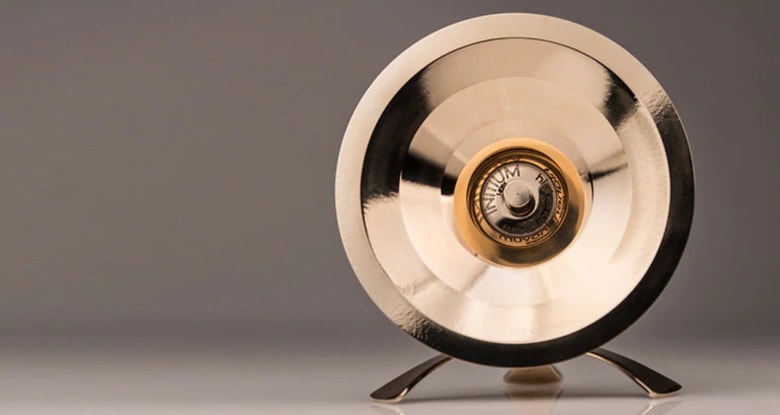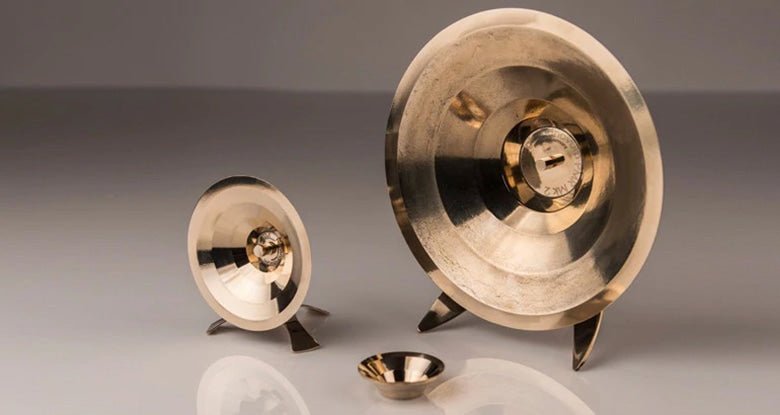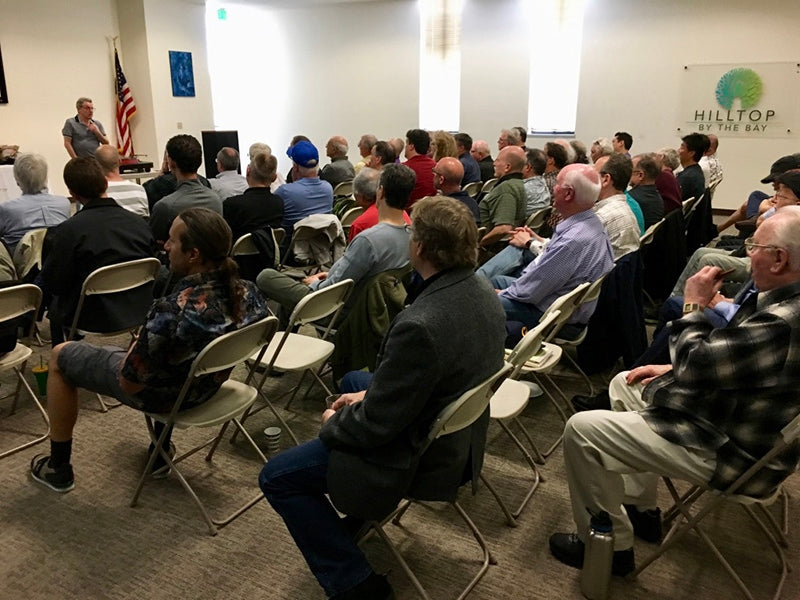Many years back, along with about a dozen fellow audio club members, I attended a product demonstration at a well-known high-end audio writer’s home that made me question my sanity.
Our host put on a selection of music most of us were familiar with – which sounded good – as you would expect from a six-figure system set up by professionals. At the end of the track, he asked attendees in the back row to get up for a second so that he could move one side of the couch away from the wall. He then placed the product – a small, heavy, well-made machined brass disk-shaped quantum harmonizer thingy – right there on the carpeted floor behind the fluffy couch.
After he returned the large piece of furniture to its place, he went back to his chair and replayed the track. Ever the stickler for protocol in A/B comparisons, I was watching to ensure that the volume control was not inadvertently changed – which is crucial, since systems usually sound better even with small increases in sound pressure, potentially giving the component or tweak credit it may not have deserved.
I still don’t understand it – but there it was. Within a few seconds of listening to the same selection, at the same volume, from the same seat, the soundstage blew open with extended width and depth and the music felt much more natural and alive than mere minutes before. We all heard the difference. Then, he reversed things by playing the track again after the thingy was taken out of the room. Immediately, the magical soundstage collapsed. We were dumbfounded. I think I remember shouting, “How is that even possible?!” in my usual calm and reserved manner.
Questions erupted in my disoriented mind. How on Earth could a small piece of machined metal behind a sound-absorbing couch in the back of the room affect my listening experience in the front row so dramatically? Was this an illusion set up by our collective brains like some mass hypnosis? If someone would have told me that this would happen, or if I read it in a review, I don’t think I would have believed it.
I recognize that this was a life-altering moment in my audiophile journey. It’s not that I now believe everything I read or hear about; I just garnered a newfound respect for what I could not explain. You could say I began making room in my crowded mind for the possibility of magic.

Transformative: the High-End Electronics Novum PMR Initium Mk II Passive Multi-Vocal Resonator.
Over these last 40 years, I’ve had many discussions with fellow audiophiles about innovative new gear, system tweaks, and what some would call “snake oil.” In these conversations, whether in-person or on online forums, my questions and comments at times elicited very strong opinions or conjectures that denigrated a product or the design principles behind it, solely because its efficacy seemed impossible – judgements people had formed without having had the experience themselves.
Enthusiasts usually have an opinion on the validity or worth of any given product or tweak. Audiophiles, in general, when presented with an innovative new idea, product or unfamiliar technology, will keep an open mind – but I’ve also met those (especially on high-end audio forums) who, when an innovation does not fit into conventional and accepted parameters, have no compunction about ridiculing and disavowing not just the product, but the very character of those bringing it to market.
I have no problem with rowdy discourse, but what makes me absolutely crazy is that these detractors probably just read about the product somewhere and formed an opinion which was likely a regurgitation of someone else’s thoughts and experience – someone who may have done the same thing themselves.
Regardless of the nature of the technology or the cost of the product being discussed, and despite how much resistance (and sometimes righteous anger) a new and unfamiliar product can stir up in some people (in which case I suggest therapy) …the only opinion about a product that is truly useful and valid is one that comes from someone who has auditioned it with their own ears –with bonus points awarded to those who have actually heard the product in question in their own system.
Our level of satisfaction is predicated by how our system’s components hang together to re-create music…basically, synergy, or even more appropriately, harmony. This is why I believe we can create extraordinary music reproduction at a wide range of system price points, from a few thousand dollars to “should I buy this audio product or another Formula 1 race car?”

A selection of room-tuning products from High-End Electronics.
So, getting to the point: Why it’s important to join or start a local audiophile club. First and foremost, if you love music and exceptional high-end gear, you would probably explode if you tried to hold it all in without sharing your excitement with other humans. Being active in ongoing discussions as part of a local audiophile community is an opportunity to expand your knowledge and participate in cutting-edge conversations that explore new ideas, new terrain…to boldly go where no man has gone before (sorry, Gene) and to ask questions of industry pundits as they present the fruits of their labors. Most importantly, this involvement in community encourages us to test what we’ve learned in our own systems and hear what’s true for us. No audio product is “the best”…it can only be the best for you (for now), because all of our ears are wired differently.
As a neutral source of audiophile education, the leadership team of a club should take care to not promote one product or technology over another – they should leave that judgment up to you and your ears.
At our club, the San Francisco Audiophile Society, most, if not all of our events highlight designers, manufacturers and providers of high-end audio equipment or services. There are no sales pitches; we ask our guest speakers to focus on educating our members on the technology and design criteria they’ve used to create their product or service. This way, any resulting product sales become a natural extension of good, clear teaching and an informed customer.
We’ve been very fortunate to learn from industry luminaries like the late Albert Von Schweikert, Michael Fremer, Dr. Rob Robinson, the late Roger Modjeski, Andrew Jones, Rick Schultz, Alon Wolf, Allen Perkins, Richard Schram, Frank Doris, Paul McGowan, Nelson Pass, Galen Gareis, John Curl, Peter Ledermann, David Solomon, George and Carolyn Counnas, EveAnna Manley, Bill Dudleston, and Steve Guttenberg…to name, well, a bunch.
Personally, like most life-long audiophiles, I can’t resist this stuff. Whether it’s cabinet design, room correction, ripping vinyl, choosing tubes, or something completely different that I don’t quite understand…I want to know! I love learning about audio and when I’m lucky enough to be in the conversation when a cool new technology makes its appearance, it flat-out thrills me. I never feel the need to believe or “buy in” to the concept being presented – I just show up with an open mind and open ears, ask questions, enjoy the process, and decide for myself.
In conjunction with audio clubs, well-educated high-end audio dealers are a tremendous asset in our industry, allowing us to hear a product in their system and, if they get a good feeling about our seriousness as a potential client, let us audition it in our homes. If any of this strikes a chord, it’ll be worth it to find your local community of fellow audiophiles who would be happy to explore the wonders of our obsession with you.
I believe that this is one of the significant ways in which technology progresses – by expanding the box that everyone is trying to think their way out of, and by bringing forward bold new ideas that welcome the unconventional. This is especially critical for small audio companies, as getting traction and support from happy customers and racking up a few good reviews can pave the way to success…at which point the detractors will say, “oh, sure, it was obvious all along!” Yeah, of course it was.
So, since the pandemic is receding and you’re already a part of the Copper worldwide community: go, find your local people, live long and prosper…and upgrade when needed.
Note: The beginning of this article references a product which I auditioned many years ago. As hard as I’ve tried, the name of the company that manufactured the expensive brass tweaks eludes me, but it could be the one pictured, or something similar.
******
Copper Community Engagement:
Have you joined or started an audio club? We’d love to hear your thoughts and experiences!
Have you auditioned a crazy audio tweak that shouldn’t have worked, but rocked your world anyway? Tell us about it by leaving a comment below.
Thanks for reading!
Alón Sagee is Chairman and Chief Troublemaker of the San Francisco Audiophile Society. Alón’s writings for Copper can be found in the following issues:
- The Audiophile’s Brain
- The Audiophile’s Cat
- Chinese Food for Thought
- The Not-So-Great Wall
- Everest, Part 1
- Everest, Part 2
- Everest, Part 3
- Mongolia, Part 1
- Mongolia, Part 2
- Two Hands Clapping
- Sublime Moments
Also, please note:
Header image: Michael Fremer of Stereophile and Analog Planet speaking to the San Francisco Audiophile Society.



